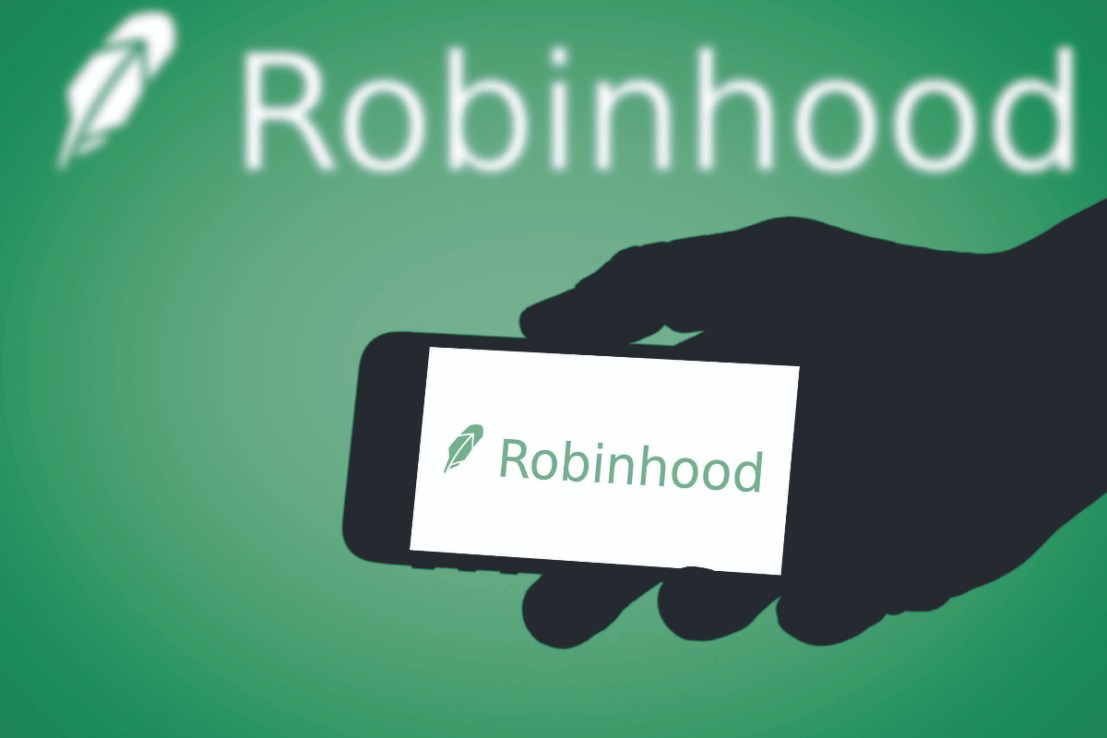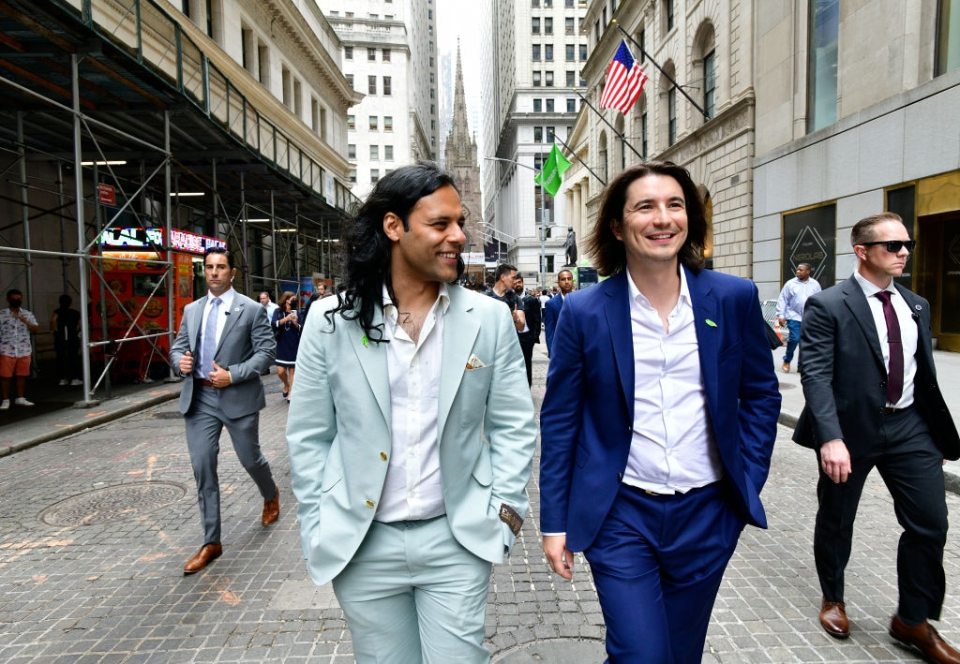Robinhood UK chief: Our Gamestop customers have ‘matured’
Robinhood's UK chief Jordan Sinclair says the company has been through a period of "growing up".


Every week, Charlie Conchie sits down with the biggest name in tech, fintech and financial services. This week, it’s Robinhood’s UK president, Jordan Sinclair.
Jordan Sinclair is a man with an unconventional approach to parenting.
For centuries fathers may have been looking to settle their kids with lullabies, toys or a bedtime story. But the man leading the UK business of flashy retail trading firm Robinhood takes a different tack with his eight-month old twins: walking them through their fledgling investment portfolios.
“Maybe they can’t respond yet and maybe they don’t believe in my investments, but in their junior ISAs, I’m making them feel a part of it from the beginning,” he laughs, speaking with City A.M. at the company’s London office. “My wife and I, one of the first things we did after they were born was to start junior ISAs.”
It’s a steady approach to investing many wouldn’t associate with Robinhood – a company that has divided opinion since it burst into the global consciousness through the pandemic.

Though it’s now ten years old, say ‘Robinhood’ and most people will think of two crises: the “meme stock” frenzy of early 2021, when retail traders poured onto its platform to send ailing US stocks to stratospheric and short-lived heights, or the tragic suicide of a young American trader who wrongly believed he had lost tens of millions on a leveraged trade.
Robinhood has for the past two years been looking to clean up that reputation and repair its relationship with regulators and politicians. It has removed the infamous on-screen confetti cannon used to celebrate customers’ deals and last week said it was “in the process of finalising the settlement” of a lawsuit brought by its aggrieved customers in the wake of 2021’s boom.
The company is hoping to draw a line under its bombastic persona and chart a path into the comparatively conservative UK market. And Sinclair, a South African with a self-confessed “boring” and “traditional” background in accountancy, has been tasked with leading it.
Third time lucky
Robinhood’s roll out to UK customers in March closed what has been a turbulent four-year-long flirtation with Britain.
Its two previous attempts fell apart at the eleventh hour; the first abandoned in 2020 after bosses decided to focus on the explosion of trading in their home market in the US through the pandemic. It then U-turned on a deal for UK trading platform Ziglu in 2023.
Some have mixed feelings over the latest UK push. Robinhood has been accused of recklessly ‘gamifying’ investing previously and triggered some fears of opening up market access to people who shouldn’t necessarily have it.
Others simply question whether the UK investor mindset is one that lends itself to a platform like Robinhood. The company borrows its ethos from its namesake – “give everyone – not just the wealthy – access to the financial markets” – and while the US has seen disruptors come through and tear apart the status quo of stock trading, the UK is still dominated by staid behemoths like Hargreaves Lansdown and AJ Bell. Hargreaves alone still holds around a 40 per cent share of the market.
UK investors still aren’t having their needs met.
That dominance has been both the allure and the downfall of a host of firms before Robinhood. US-based rival Public announced a triumphant launch into Britain last year before beating a hasty retreat just six months later. Sinclair’s UK-headquartered alma-mater Freetrade, from which he joined the firm, has also faced its own woes in trying to break the dominance.
“UK customers still aren’t having their needs met by some of the challengers, and you see that none have captured a meaningful share of assets or represent a major challenge to your Hargreaves and the like,” he says.
“But I think there’s a big swathe of customers that are looking for something a bit more fresh and a bit more relatable to them.”

Regulatory jitters
Regulators in the UK have been nervous about the approach of Robinhood and the flashier tendencies of the retail trading industry, however. The year before the firm even entered the UK, the Financial Conduct Authority issued a pointed warning to the market over the use of confetti in trading apps.
“We are concerned that these positive reinforcements may encourage people to trade more frequently or make investment choices that they otherwise wouldn’t,” the FCA said, adding that some features “may blur the lines between online investing and gambling-like behaviours”.
Sinclair’s PR is quick to prompt him into saying the “fireworks” and confetti are “long gone”. And the Robinhood chief is similarly fast to object to my use of “betting” when I ask about his own investments – “I believe the stock market is the best vehicle for long term wealth creation,” he adds.
Even so, the FCA has already been quick to clip Robinhood’s wings after its UK launch.
The firm was planning to launch a product allowing its customers to borrow cash at 12 per cent rate to then invest in the market, but has since been forced to shelve the plans.
“That’s part of expanding right,” Sinclair says. “You have your [US regulated] products and bringing them over here and making sure the regulator’s comfortable from a consumer duty perspective, and just working together with them.”
The ‘margin lending’ has been put on pause while the two parties continue “ongoing discussions”.

‘Growing up’
The backlash and regulatory scrutiny have demanded what Sinclair describes as a period of “growing up” for the company over the past few years.
Despite its best efforts, it has been struggling to disentangle itself from the fallout of the meme stock bonanza and its decision to block trading in the US at the height of the frenzy, a move that sparked a huge lawsuit, protests at its California HQ and criticism from US lawmakers.
While he says Robinhood has learnt from the experience, the “meme stock” saga itself was, he claims, an example of the platform’s mission in action.
“I think taking a step back from Gamestop or any particular stock during that period, the thing that Robinhood set out to achieve was to create access,” he adds.
“And what that proved is that the retail investor did get access to the markets as if they were anyone else, right? They didn’t need to have a certain level of income or a private bank account to have a stock account.”
Those fears have been thrust back into the spotlight in the past few weeks as retail traders once again rushed towards stocks after a few cryptic tweets from the man who started it all: Keith Gill aka. Roaring Kitty.
Rather than being a hiccup, though, Sinclair argues these brief spikes can offer a way into the market for a new group of investors.
“Roughly 80 per cent of those customers that held Gamestop are still customers with us. They’ve opened retirement accounts with us. They’ve got a cash yield accounts, cash savings account that offers high interest rates.
“They’ve grown on the investment journey,” he adds.
“[Gamestop] might have been their starting point – and there’s definitely pros and cons of that being a starting point – but they have matured over time and stuck with us and one can say that we were their ability to gain access to that journey.”
I think the one of the best ways to get into investing is to start, and then we don’t encourage you to put your life savings in.
Open access
Democratising access at all costs is one of the questions that has dogged Robinhood. The company has shifted to place a premium on education and information, and its UK platform now tries to push information in front of its customers.
But even so, the only obvious guardrail in the sign-up process is a question of how much experience you have. “Not very much” is the answer as I sign up, and I’m away within fifteen minutes of downloading.
Is it a concern that anyone can begin investing that quickly?
“I think the one of the best ways to get into investing is to start, and then we don’t encourage you to put your life savings in, we do ask you investor profile questions. So there is definitely some gathering of information about you that is kind of in line with our requirements,” Sinclair says.
But is one question on experience too easy a bar to jump over?
“I guess, how would you ever gain experience? I think it’s making sure that you have that access and education combined,” he counters.
Retail politics
His tone chimes with a wider cultural shift being hurried along by policymakers in the UK. The government and Labour Party are both keen to ignite a more risk-on approach from investors and bring some of the US mindset to these shores.
That appetite has been on the slide in recent years. Retail investors control just 21 per cent of UK assets under management, the lowest percentage in Europe, according to a report from the Centre for Policy Studies, and the percentage of UK equities owned by UK residents has been falling consistently for decades.
Just 11 per cent of households own shares in domestic companies, according to New Financial.
Its expansion has therefore been warmly received by ministers. Founder Vlad Tenev was courted by senior government figures last year and the investment minister Lord Johnson threw his support behind the launch last November, describing it as a vote of confidence in the UK fintech scene.
“We’ve had great support,” Sinclair says. “I think for us, the UK represented all the things we wanted as our first market. It’s a Fintech hub, it has the technology in place to do business, the market opportunity – the investment space is growing every year. There’s a large opportunity.”
It’s also been cleverly hedging its bets in the run up the election. An executive at a top retail investment firm told City A.M. last year that Robinhood was “everywhere at Labour party conference trying to jump on the retail investment policy bandwagon”.
“We spend time with both parties, right?,” Sinclair adds. “We don’t necessarily spend time with one or the other, but I think all of them have had positive intentions.”
‘Not the last’
It’s a diplomatic answer that captures his approach to the market. The “boring” background of Sinclair looks a deliberate ploy for a company trying to reshape its image after years of crises.
Robinhood is trying to soothe and restrain the hypergrowth model that seemed to unsettle lawmakers the world over. But, he’s clear, that doesn’t mean it will be halting any plans for world domination.
“I think it has been a great first place for us. It’s certainly not the last.”



